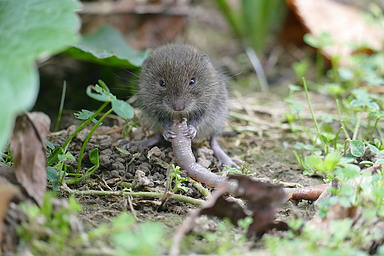Control voles in the garden because voles are a nuisance that destroys your vegetables. It damages not only the garden or your vegetables but also trees. If the roots of the vegetables will be the most useful during the main garden season, at the end of the season, after the month of September, he will start gnawing the roots of the fruit trees. When you notice holes dug by voles, you must react immediately. Otherwise, it will be too late.
Vole or Mole
The vole (Arvicola terrestris) belongs to voles, i.e., rodents, which also include the muskrat, and much smaller species, such as the meadow and field voles. They are not like a mole. People confuse the mentioned animals because they both dig burrows in gardens and meadows. They look entirely different up close. Moles and voles usually stay underground, so you’ve probably never seen them before.
Voles are small, stocky rodents similar to field mice. In fact, a vole can look like a mouse at first glance. Unlike the mole, it is a vegetarian and does not attack insects and various blackheads that cause damage to your garden. Since the mole is not a rodent, it digs burrows with its front paws. On the other hand, the vole literally gnaws its burrows with its teeth.
What Does the Vole Feed On?
Like many other rodents, it is omnivorous, which means that its diet includes the roots of plants and fruit trees, potato tubers, carrots, and young stems of newly planted trees.
How will you know that a vole is in the garden? There are no roots in the beds because he ate them, and the burrows are wider than high; unlike the mole, he only causes damage to plants and fruit trees… When winter comes, many of the vole’s favorite food is no longer available, so he moves to the bark and roots fruit trees. Some voles don’t have a problem with winter because they simply don’t live long enough. On average, voles live only for 3 to 6 months.
Damage and Diseases Caused by Voles
The vole does damage not only in the garden but also on fruit trees. Due to damage, fruit trees may develop poorly or not have young shoots in the spring.
A very well-known disease caused by rodents is murine fever. The disease is transmitted to humans via the vole through the inhalation of viruses found in particles of secretions (urine, feces, saliva).
How to Control Voles in the Garden With Traps
In smaller areas, you can use vole traps placed near plants and fruit trees. There are also peanut butter baits. Set your baits from midday to early evening when these critters are most active. One of the solutions, probably the most effective, is the physical protection of plants. Some use densely woven mesh baskets. They protect both ornamental bulbs and tree roots.
The worst choice is poison. Because they do not act selectively, it kills many other animals that ingest the poison. To the vole, the scent of daffodil bulbs and imperial tulips and the roots of castor and datura plants reek. We can also buy organic fertilizers with higher nitrogen content, smoke cartridges, and sulfur sticks, which often only temporarily repel voles.
Control Voles in the Garden in an Ecological Way
Anything that smells like garlic, onions, or citrus is very bad for a vole. Therefore, stuff organic lemon and orange peels, cypress twigs, flowers, and elder branches into the holes. For successful natural plant protection, use an organic agent against voles, and instead of garden beds, plant the plants in planter bags and high beds. The vole will not chew through the fabric, so your plants will be safe.
You can also use solar-powered outdoor pest repellent.
You can attract predators such as badgers, foxes, snakes, and badgers to your garden.
